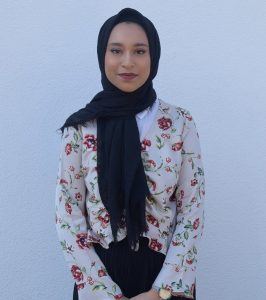On Friday 26th April, we funded two of our PGR students to attend the 3rd annual BME Early Career Researchers’ conference at the University of East London. This year’s theme was ‘How to Stay in Academia’.
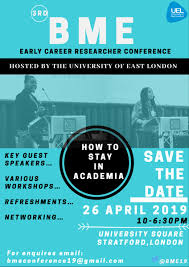
The conference aims to encourage and empower BME (Black Minority & Ethnic) early career researchers to stay within academia, and promotes the ethos ‘be positive, practical, and pragmatic’ in driving career progression. Speakers included inspirational people such as award-winning writer, academic, and human rights campaigner Professor Gus John, and KCL Dental Institute lecturer and Diversity and Inclusion Champion, Dr Bernadine Idowu-Onibokun.
We chatted to our two PGR students who attended, Aisha Islam and Nana-Jane Chipampe, to find out what they thought of the conference.
What were your impressions of the conference?
The conference was hosted at the University of East London, where I arrived to meet many senior BAME academic staff and PG researchers from multiple disciplines and cities across the UK. The programme began with the delivery of short, inspirational talks from, most notably, Professor Gus John and Dr Bernadine Idowu-Onibokun, both of whom have contributed substantiality and significantly to managing Education and Equity, and Regenerative Medicine in Dentistry, respectively. This was followed by a panel discussion addressing the following topics:
- The journey of each BAME academic within academia
- The importance of the visibility of a BAME academic
- What the barriers and challenges of gaining senior positions for BAME academics are
- What needs to change
The discussions were supportive, insightful, and inspiring, providing an excellent forum to consider my opportunities for continuous professional development and career growth. The structure of the event was relaxed and informal. I had the opportunity to meet and build connections with brilliant, like-minded BAME researchers who share the same enthusiasm for academia.
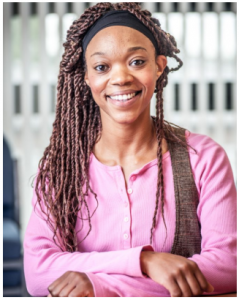 I was really impressed with the format of the conference. There were short, inspirational talks by various academics, describing their journeys and it was motivational to hear their insightful and inspirational guidance. All speakers gave honest accounts of their personal journeys, which was particularly humbling to hear. There was also workshops that addressed applying to and writing for fellowships, mentoring and sponsorship, fantastic tips and advice on networking, and the importance of wellbeing and maintaining work-life balance. These workshops provided supportive, engaging, and productive advice, all directly relevant to the everyday research environment.
I was really impressed with the format of the conference. There were short, inspirational talks by various academics, describing their journeys and it was motivational to hear their insightful and inspirational guidance. All speakers gave honest accounts of their personal journeys, which was particularly humbling to hear. There was also workshops that addressed applying to and writing for fellowships, mentoring and sponsorship, fantastic tips and advice on networking, and the importance of wellbeing and maintaining work-life balance. These workshops provided supportive, engaging, and productive advice, all directly relevant to the everyday research environment.
What is the most important take-home message for you as a BAME researcher from this event?
Academia presents several challenges when obtaining external funding, maintaining a publication record, and progressing through your career. The key take-home message I retained from the event was to remain positive, practical, and pragmatic, in order to feel empowered to remain in academia. Undertaking doctoral research and beyond involves a transition of learning styles from the traditional, rote learning style practiced within primary and secondary education, and to some extent during undergraduate education, to a critical and analytical approach, which requires a higher degree of independence. As a PGR or early career researcher (ECR), this can be an intimidating process, given the feedback of progression is often limited and can fuel self-confidence issues and psychological phenomena such as ‘Imposter Syndrome’.
In an environment where self-doubt of abilities and strengths is rife, it is important to consistently celebrate small successes. I met a huge number of BAME researchers determined to stay and excel in academia throughout the course of the conference, which was admirable and motivational.
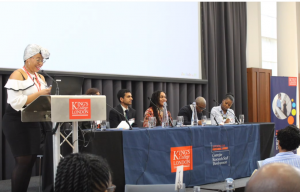
The most important take-home message from this event for me was be POSITIVE, PRACTICAL, and PRAGMATIC. This can be achieved in many ways. By being persistent and pragmatic in my research and overcoming the difficulties I face with a positive mind, I can feel empowered in academia and maximise my ability to achieve my potential.
How has this conference affected your perceptions regarding your own career as a BAME researcher?
My uncertainties regarding remaining in academia were overcome by the opportunity to spend time with senior academics of minority backgrounds who filled an entire lecture auditorium – which was liberating to say the least!
The afternoon workshops, focusing on applications to fellowships, mentoring and sponsorship, and networking and wellbeing, were incredibly informative and affirmed my understanding of these areas, alongside helping to ensure I am maximising my potential as a BAME researcher. The short talks provided evidence for the extraordinary and compelling contributions made by BAME academics across a vast array of disciplines in research and have helped me to transcend my own expectations of academic achievement and success.
The conference has made me aware that it is important to have key individuals to facilitate your research journey. Find, develop, and sustain relationships with other researchers, as ‘people need people’. As a researcher, I learnt that it is important to collaborate and network with others, and remember who you are, what your purpose is, and how you want to achieve your goals. I am now more aware of the importance of surrounding yourself around individuals who can encourage and support you through your journey in academia.
Do you think such conferences aimed at BAME ECRs are useful? How do you think you could encourage other BAME ECRs to attend such events?
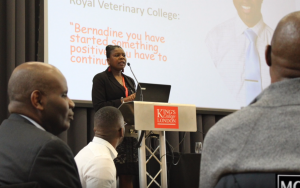
The multiplicity of academic backgrounds present at the conference ignited meaningful and thought-provoking discussions on tackling issues faced by BAME academics. The event was a unique opportunity to vocalise concerns and negotiate strategies to overcome hurdles and encourage progression, and most importantly, to receive affirmation of my experiences of difficulties associated with being part of a minority in higher education and academia (e.g. disengagement from the curriculum due to a lack of inclusivity, isolation, and micro-aggressions). The attainment gap between white and BAME students remains significant, alongside the disparity in employability between white and BAME graduates.
We were introduced to a relatively new journal, the ‘Journal of Impact Cultures’, which endeavours to transform educational policy and practice through the decolonisation of the curriculum and culture that currently exists in higher education. As the journal challenges debates in teaching and learning through an interdisciplinary approach, it may be of interest to many BAME researchers seeking to create change within education for them to submit their narratives, reflections, and empirical reports.
I would encourage other BAME ECR’s to attend by speaking to their fellow network members for guidance or general discussions about the benefits of such a network. Ultimately, the conference addresses many layers of complexity regarding identities existing amongst BAME academics and allows us to identify areas in which to intervene, in addition to finding solutions, in order to resolve racialised inequalities within higher education.
I strongly feel that conferences aimed at BAME ECRs are extremely useful, due to the psychological impact of spending a day among intelligent, encouraging, and dedicated BAME academics. I felt particularly empowered to stay in academia when speakers spoke on the topic being your authentic self and being proud of who you are. A university’s ethos should reflect the diversity of the institution, and conferences such as these remind you of this. I believe research is a key component of knowledge production and knowledge sharing, and events like this encourage you to be confident in doing so.
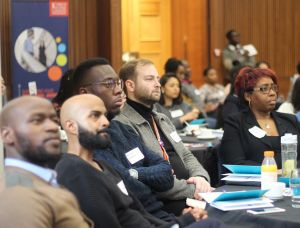
I would encourage other BAME ECRs to attend such events, as it is refreshing to step away from your niche area of research and explore a different type of learning experience – learning through others. I would encourage BAME ECRs to put themselves in environments where interesting, thought-provoking discussions take place, and the BAME ECR conference provides a platform to receive encouraging and practical tips to put yourself in the best position to succeed.
Thank you so much to Aisha and Nana-Jane for chatting to us about their experiences, and we’re glad you got so much out of attending!
To find out more, read about the conference, or watch the promotional video. Or, if you’re interested in other opportunities available to BME staff and students, check out NU’s BAME Network.

